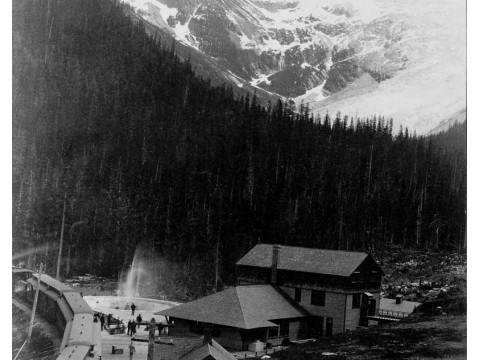Backcountry skiers and boarders heading to the steep and deep powder of Rogers Pass in B.C.'s Glacier National Park will have to make note of changes to the Winter Permit system for the 2009-2010 winter season in that park.
Extensive changes to the permit system came into effect Nov. 25, including changes to Winter Restricted and Prohibited Area boundaries, and parking and permit registration.
The Winter Permit system allows backcountry users to enter Winter Restricted Areas that are affected by the highway avalanche control program when artillery gunfire is not anticipated. This system protects the public from danger resulting from direct artillery fire, including shrapnel that can travel up to 1,000 metres and the potential for sympathetic avalanche releases.
Avalanche control work is conducted to keep the Trans Canada transportation corridor open, explained Glacier and Mount Revelstoke National Parks spokesperson Marnie DiGiandomenico, and not to mitigate any avalanche hazards for the benefit of backcountry recreationalists.
Anyone travelling into the backcountry in winter should have proper training to assess avalanche terrain and conditions, as well as the appropriate equipment and skills for self-rescue, she said.
The changes to the permit system include a decrease in size of four Winter Prohibited Areas - Abbott, Fidelity, Macdonald West Shoulder and Cougar. As well, another Winter Prohibited Area, Heather Hill, has been added.
At the same time, most Winter Restricted Area boundaries have been expanded in order to firmly apply an industry standard of 1,000-metre standoff from artillery targets. Parks Canada's avalanche control work is done in partnership with the Department of National Defence, which uses 105-mm Howitzer guns and ammunition.
Three new restricted Areas - McGill, Cheops North and Grizzly Shoulder - have also been established. Access to the Tupper and Ross Peak Restricted Areas have been re-established via routes that avoid crossing CP property, following a solution that was arrived after consultation between interested groups last spring.
Any backcountry users wishing to enter a Winter Restricted Area must acquire a Winter Permit. As well, anyone parking at Bostock, Hermit, Rockgarden, Loop Creek, NRC Gully or Stone Arch must obtain a Winter Parking Permit, which is available at the Rogers Pass Discovery Centre.
As for the Fortitude (Flat Creek), Smart and Shaughnessy Winter Restricted Areas that cross CP property, Parks Canada and CP are integrating suggestions from public consultation and investigating solutions for access, DiGiandomenico said. Vehicles parked at these sites may be towed by CP patrol vehicles, which have authority to impound vehicles illegally parked on CP property.
The reason behind the changes are simple, DiGiandomenico explained - public safety in response to increased visitation.
"Parks Canada's primary concern is for public safety," she said. "Changes were made to address expanding terrain use by backcountry recreationists and the operational need to separate recreation activities from avalanche control actions. The changes have also incorporated safe public parking areas. Some changes have increased terrain accessible to skiers, while still preserving snow study areas for the avalanche control program."
Following suggestions offered by backcountry users during last winter's consultations, Parks has invested time and staffing to introduce an Annual Winter Permit for entry into Winter Restricted Areas for the 2009-2010 season, DiGiandomenico added. The permit is free and eliminates the need for visitors to travel to the Rogers Pass centre on every trip. Individuals wishing to obtain season passes will need to attend an orientation session, sign a waiver and abide by the terms and conditions. Orientation sessions will take place at the Rogers Pass centre throughout the winter on Saturdays and Thursdays at 3 p.m., with additional sessions on Dec. 22 and 29.
Daily permits are also available at the centre, but must now be obtained by every individual and not only group leaders.
Anyone entering a Winter Prohibited Area or a Winter Restricted Area that is closed to entry, or not complying with permit conditions or parking restrictions, may be prosecuted resulting in a maximum fine of $2,000 and/or permit cancellation, she cautioned. Illegally parked vehicles can be towed at the owner's expense. While the Trans Canada Highway itself is not part of the Restricted or Prohibited Areas, highway ploughing and avalanche control activities place restrictions in some areas, including no stopping inside signed avalanche areas along the highway.
More information is available at (250) 837-7500, or at www.parkscanada.gc.ca/glacier




